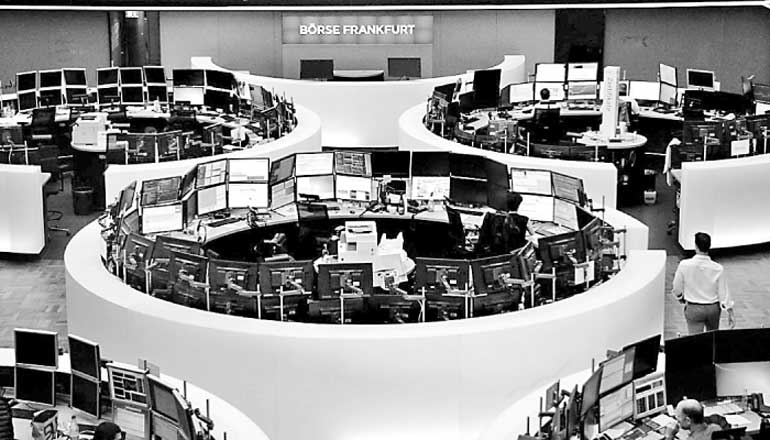Friday Feb 27, 2026
Friday Feb 27, 2026
Saturday, 19 August 2017 00:07 - - {{hitsCtrl.values.hits}}
 London (Reuters): World stocks were set for a second day of losses on Friday after an exodus of U.S. executives from presidential business councils dealt a fresh blow to hopes of tax reform, hammering Wall Street and filtering through to Asia and Europe.
London (Reuters): World stocks were set for a second day of losses on Friday after an exodus of U.S. executives from presidential business councils dealt a fresh blow to hopes of tax reform, hammering Wall Street and filtering through to Asia and Europe.
Investors fled instead into German and U.S. Treasury bonds and bought gold for the third day in a row, as the appeal of such top-notch assets grew further due to a deadly attack that killed at least 13 people in Barcelona.
Markets have been dismayed by U.S. President Donald Trump’s latest controversial comments on violence that flared in Charlottesville, Virginia, after a white nationalist protest.
Several business leaders have since resigned from his advisory councils and a White House official said plans for a council on infrastructure had been dropped.
These events, which also alienated some of Trump’s Republican allies, have dashed hopes for tax cuts and infrastructure spending, campaign promises that fuelled much of this year’s gains in world stocks, emerging markets and commodities.
Equities worldwide are still on track to end the week in the black as fears ebbed earlier in the week that the United States and North Korea were headed for a nuclear standoff.
But with New York’s equity indexes all tumbling on Thursday to multi-week lows, MSCI’s index of Asian shares outside Japan fell 0.6% on Friday, emerging stocks lost half a percent and MSCI’s world index, which tracks shares in 46 countries, slipped 0.3% to one-week lows.
“In a week where we started by worrying about nuclear war, markets have quickly moved on from this, with yesterday’s weak session more of a response to fears that Mr Trump’s strategy for the economy and business is falling apart and later the terrible terrorist attack in Barcelona,” Jim Reid, a strategist at Deutsche Bank, told clients in a note.
The pan-European STOXX 600 index opened 0.9% lower. Losses were led by travel and leisure as investors reacted to the Barcelona attack by selling shares in airlines such as Ryanair, EasyJet and Spanish airport firm AENA.
US equity futures signalled a weaker opening on Wall Street too.
Equity weakness is heaping more pressure on the dollar, pushing it down 0.5% against the yen, the lowest in a week and approaching one-year lows of 108.13 yen hit in April.
ING Bank analysts predicted the dollar would remain pinned near current levels, at the expense of the yen.
“Tail risks such as geopolitics, protectionism and the unwind of easy central bank money all provide valid reasons to remain cautious in chasing risk,” they told clients.
“Dollar/yen continues to capture this nervousness and could move down towards the 109.00 level.”
The euro edged up 0.2% to the dollar, after tumbling on Thursday to a three-week low of $1.1662 after minutes of the European Central Bank’s July 20 policy meeting showed the bank was worried about the currency rising too much.
ING saw the ECB’s euro concerns as justified and expects the bank to proceed cautiously while unwinding stimulus, in turn limiting the upside to European bond yields.
Yields have fallen in recent days following the ECB comments and amid the dash for defensive assets, with 10-year Bunds at a one-week low of 0.41% while 10-year Treasuries traded just off one-week lows hit on Thursday.
The turmoil also benefited gold, with spot prices for the metal rising 0.4% to the highest in more than two months and on track for its second week of gains.
Brent crude futures rose 0.35%, rising off three-week lows hit on Thursday as the dollar continued to weaken and signs appeared that supply is becoming tighter in the world’s biggest energy consumer, the United States.